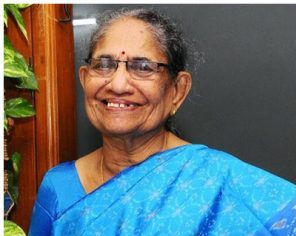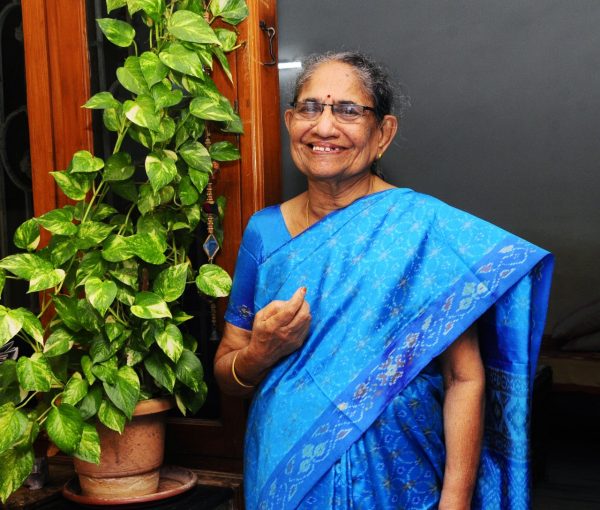HERE I AM and other stories
2. Damayanti’s Daughter
(Part-2)
Telugu Original: P.Sathyavathi
English Translation: Sashi Kumar
Anuradha ma’am was reading aloud ‘The Forsaken Merman’ written by Mathew Arnold:
Call once yet
In a voice that she will know:
‘Margaret! Margaret!’
(Call once more) to a mother’s ear; Children’s voices should be dear Children’s voices, wild with pain.
Surely she will come again.
Call her once and come away. This way, this way!
He was reminiscing:
‘Once she sate with you and me,
On a red gold throne in the heart of the sea, And the youngest sate on her knee.
She comb’d its bright hair, and she tended it well.’
Whatever lesson she taught, Anuradha ma’am forgot herself and became one of the characters in the lesson. The woman had left her husband, a merman, and their children. The merman was goading the children to call her back. The teacher was so involved that her voice grew hoarse as she became the merman – ‘Here came a mortal, but faithless was she.’ I listened and tears flowed down my cheeks. The lesson was ending. The last lines: ‘There dwells a loved one, but cruel was she!’ As the teacher spoke these lines, the last bell rang. I do not know how I came home, but I scurried out of the class so that my tears would not betray me.
‘But cruel was she!’ rang in my ears. I threw the framed photo of my mother that I had brought with me when I had come here with my aunt on to the floor in anger. Eventually, I picked up the photograph and got it laminated so that it would not tear a second time. But I kept it at the bottom of the trunk. I wept my heart out. ‘Cruel was she!’ I wondered how my brother was so stoical. It was I who wailed for her, craved for her, yearned for and was angry with her. But still I could never forget her. She was my shadow – a shadow that was long now, short the next time and vanished altogether at times. I would pretend the shadow did not exist. She was my mother – a mother who made me a motherless child; a mother who made my childhood an ocean of tears.
As I slowly understood where Damayanti had gone, I wrote to my brother, ‘Does our mother love that person more than you and I? Doesn’t she love us at all? At least she could have taken us along with her?’
He replied: ‘Poor girl! When you could not treat her, whom father brought home as mother, how would you have treated him whom mother asks you to treat as your father? Wherever we live, we have only one parent. Forget about these things and get on with your studies.’
‘The day I brought you with me and saw you wailing, holding my legs, I did not think I would be able to keep you with me this long. We have become so close. I realized how much a girl can add to my life when she moves about in the house. You have brought all my efforts to fruition and have been successful in your studies. Go! Take your father’s blessings now before joining your new job. He is your father, after all. Take some sweets for the children and clothes for your father and her,’ advised my aunt. She hugged me close before I left.
I asked my father for the first time, ‘Why did mother leave you? Did you not look after her well? Why did you tear the letter she wrote to you? We would at least have known why she left us.’
If my age made me bold, his age had mellowed him. Looking around and making sure that ‘my mother’ was not there, he said, ‘Child! I am a down-to-earth man. She was a heavenly spirit. She could not adjust to this mundane life and so left. There is nothing more to say.’
I could not understand whether he was being sarcastic or sincere.
Another heavenly spirit had walked in with her singing . . . Aao huzoor tumko sitaaron mein le chaloon (‘Let me take you to the realm of stars’). Did she get the love she sought, at least there? How would I know?
When I cannot concentrate on the book at hand or when sleep plays hide and seek with me, I get a call from my brother across the Atlantic. Only he knows when to call me.
‘What news, Ammadu?’ he asked.
‘Santosh from Samalkot has assured me that he will convince his parents to agree to the match even though I am Damayanti’s daughter. Of course, he has already made thorough enquiries from my colleagues,’ I replied.
‘What more do you need then? He has chosen you. Best of luck! He must be very shrewd. Along with the marriage symbol of bottu, he will also stick the bottu of the stigma of your mother on your forehead and use it whenever he thinks necessary. You will be indebted to him all through your life for his generosity. And if, by chance, sometime in the future you become conscious of your education, job and intellect and answer him back, the stigma of your mother will work like a paperweight,’ he laughed.
But I returned to the question that always haunted me, ‘How could our mother forget us in the first place, tell me?’
I love asking the same question again and again, hearing his usual answer – his philosophizing in an emotionless voice.
‘Ammadu! Why do you think that she forgot us? Maybe she is thinking of us just as we think of her. Don’t you think that she has a right to her life and should be able to mould it the way she wants? We can’t demand sacrifices from her for our sake. We will never know the circumstances that prompted her to leave us, unless she reveals them herself. Leave it at that. Pray that as our mother, she should be happy, wherever she is.’
‘What about the agony I suffered all along?’
‘What about the agony she would otherwise have had to put up with if she had remained with us?’
I had no answer. I don’t know what answer she had!
*****
(to be continued..)


